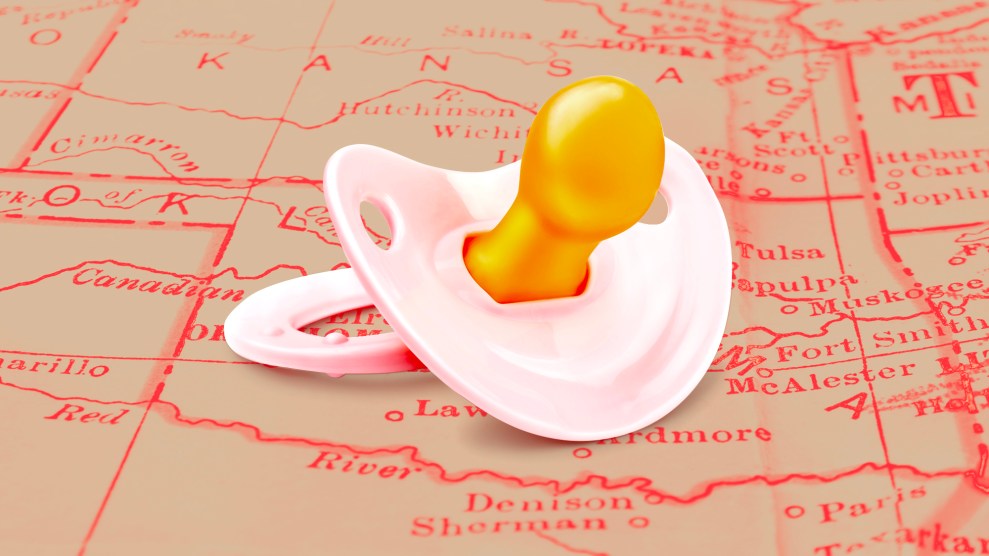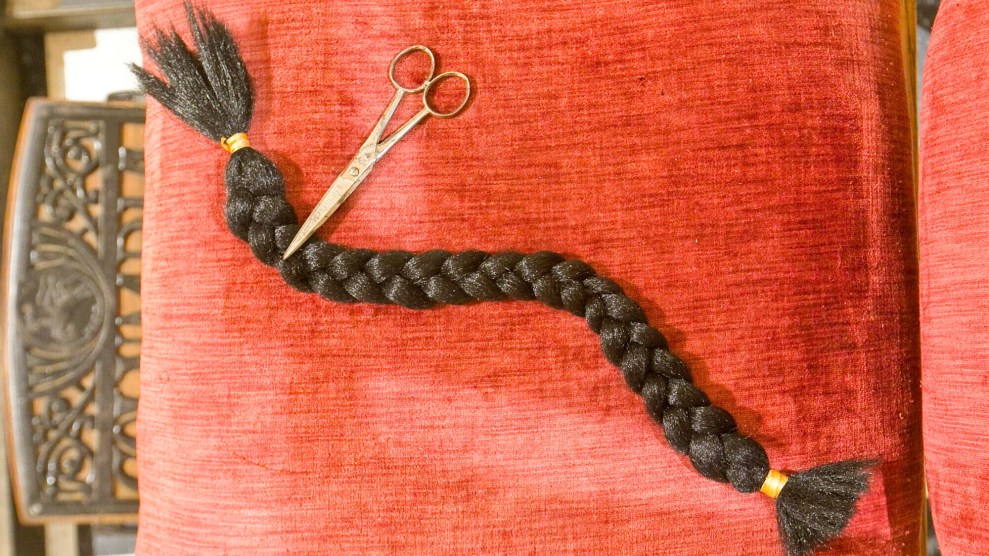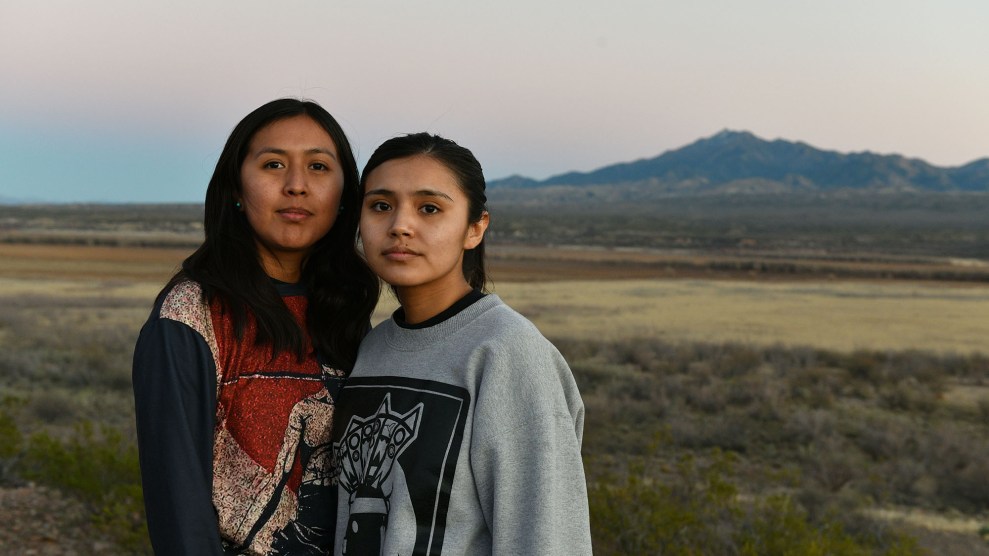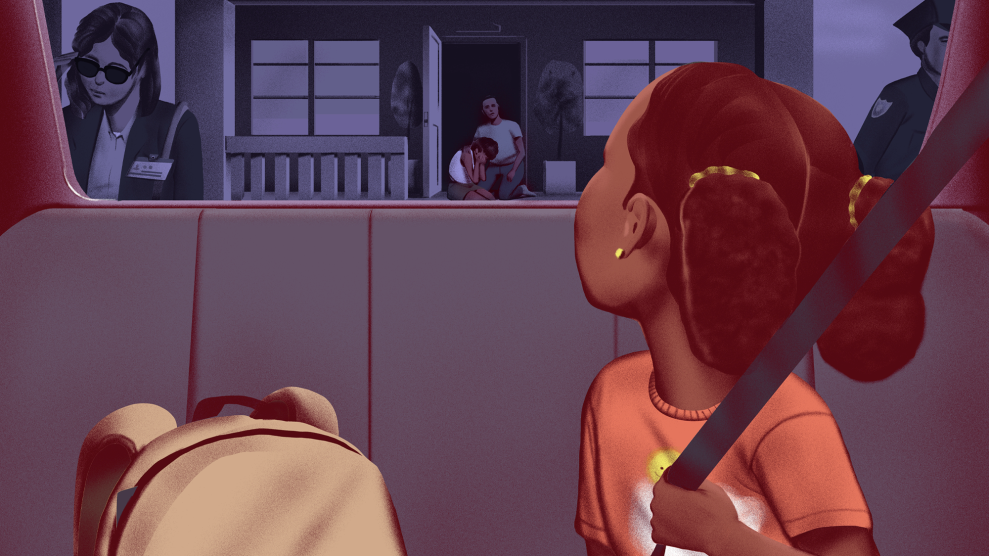
Mother Jones illustration; Getty
In 2016, a Navajo and Cherokee 10-month-old named Zachary arrived in the home of a white, evangelical couple named Jennifer and Chad Brackeen. The Brackeens lived on an acre lot outside of Fort Worth, Texas, with a pool and a zip line. The couple had come to believe that fostering children was one way, they told the New York Times in 2019, to “rectify our blessings.”
The Brackeens were told from the outset that they would not be able to adopt the baby, whose mother had a history of drug use. The Indian Child Welfare Act, the 1978 legislation passed in response to the long history of family separation and forced assimilation of Native communities, prioritizes placing Native children who have been removed from their parents with relatives and members of the same tribe. But the Brackeens became attached to Zachary and, by the spring of 2017, had decided they wanted to adopt him. When a judge ordered that Zachary be placed with a Navajo couple who could adopt him, the Brackeens pushed back, obtaining an emergency stay. Eventually, the tribe backed out. The Brackeens finalized their adoption.
The custody battle for Zachary is one of three lawsuits that now form the basis of the Supreme Court case known as Brackeen v. Haaland. In all three lawsuits, non-Native foster parents wanted to adopt Native children; two of the three were ultimately successful in doing so. But the foster parents—along with the attorneys general for three states, with the backing of deep-pocketed right-wing groups like the Goldwater Institute and the Bradley Foundation—are suing the federal government and five tribes on the grounds that ICWA represents race-based discrimination and an overly intrusive federal government.
“One of the things that tribes need to continue to exist is their children,” says Shannon Smith, executive director of the Indian Child Welfare Act Law Center, which provides legal services for Native families. “Things just don’t exist if you don’t have kids.”
Some legal scholars argue that the case, which will be heard before the court on Wednesday, threatens to not only strike down ICWA, but also to question the fundamental rights of tribes that go well beyond child welfare—including rights around water, land, gaming, policing, and Native sovereignty itself.
“All children would benefit from such a commitment”
For 150 years, the federal government funded more than 400 boarding schools, often run by churches, that stripped Native children of their language, religion, and culture. As the boarding school movement died down in the mid-1900s, government-sponsored programs, including the Indian Adoption Project, emerged to place Native children with non-Native adoptive families. A 1966 Bureau of Indian Affairs press release read, “One little, two little, three little Indians—and 206 more—are brightening the homes and lives of 172 American families, mostly non-Indians, who have taken the Indian waifs as their own.”
By the time ICWA passed in 1978, between 25 and 35 percent of all Native children had been taken from their families and put in foster homes, adoptive homes, or institutions, according to surveys by the Association on American Indian Affairs.
The recency and lingering trauma of this history can’t be overstated. One of the three lawsuits wrapped into the Supreme Court case involves Christian foster parents in Minnesota, Danielle and Jason Clifford, who sought custody of a girl whom they raised for 18 months who goes by P.S. in court documents. After a years-long battle, P.S.’s grandmother, Robyn Bradshaw, a member of the White Earth band, won custody of her granddaughter. A striking amicus brief Bradshaw filed in the case reads:
As a child, Ms. Bradshaw was forced from her own home into a residential boarding school—from which she ran away. Thus when she was separated from P.S., she resolved to persist until her granddaughter was returned to her care. When the County erroneously refused to place P.S. with Ms. Bradshaw, she pressed on, attending every hearing in P.S.’s case. Ms. Bradshaw persisted in investigating placements with family and kin; she persisted by finding a non-profit to provide legal support to her efforts; she persisted in overcoming disqualifiers to her foster care license; she persisted through home studies, administrative corrections, hurtful media coverage, hearings, and appeals.
She persisted until her granddaughter came home.
Federal policy, as well as decades of research on best practices, instructs child protective services to keep families intact when possible. When children are removed because of suspected abuse or neglect, states must make “reasonable efforts” to reunite children with their parents. But time and time again, CPS agencies fail to live up to these principles: Examples abound of children who didn’t need to be removed to begin with and of relatives volunteering as foster placements who were overlooked. Such treatment is particularly well-documented in cases of Black and Indigenous families, who are far more likely to enter foster care than white children.
ICWA adds guardrails at every step of a child welfare case. The law raises the standards needed to remove a child; except in emergency circumstances, children are placed in foster care only if there is “clear and convincing evidence,” including testimony of culturally qualified expert witness, that the child will likely be harmed if they stay with their parent or guardian. If children are removed from the home, the state must prioritize placing them with relatives or members of the tribe.
Critically, ICWA requires the state to take “active efforts” to reunite Native children with their families. In non-ICWA cases, it’s not uncommon for parents to receive a list of services, like therapy or parenting classes, they must pursue to be reunified with their children. In ICWA cases, however, caseworkers specifically trained in working with tribes may make phone calls to help parents get housing, financial support, or other needed services. David Simmons, director of government affairs and advocacy at the National Indian Child Welfare Association, said “active efforts” could mean saying to a parent, “I think we should work with helping you towards your parenting capacity. We have a class on Wednesdays at 7:00 on the other side of town. Do you have transportation? Do you have child care needs? Are there any considerations around your work schedule? We want to make sure this is the right class for you, so we’ve also checked in to make sure that they’ve worked with other Native families so far and done so successfully.”
ICWA does not mean that Native kids are only placed with families or tribes. In fact, Simmons says, about the same number of Native children are adopted by non-Native families as Native families.
In the four decades since the law’s passage, ICWA has become a model for federal and state child welfare policy reform—particularly its focus on placing children with relatives or friends of the family when possible.
“ICWA more than exemplifies these best practices; it helped shape them” reads an amicus brief in support of the defendants by Casey Family Programs. “ICWA’s strong commitment to preserving Indian children’s family and community ties is essential to protecting their best interests. All children would benefit from such a commitment.”
The “machine” behind the case
The Brackeens’ case did not organically evolve from a local custody fight to a Supreme Court case. Rather, it is the result of yearslong effort of a small group of right-wing organizations to overturn ICWA.
Among them are the Goldwater Institute, a conservative think tank in Arizona that has argued against ICWA in more than a dozen cases since 2015, claiming that the law denies Native children of equal protection against abuse and neglect because of their race. Clint Bolick, who led Goldwater’s litigation strategy before becoming a justice for the Arizona Supreme Court, has made a name for himself arguing discrimination in cases ranging from voting rights to school integration to affirmative action. The Times once referred to Bolick as the “political right’s point man on race.”
Then there’s Gibson Dunn, the law firm which has been representing the Brackeens pro bono. The firm has represented plaintiffs in several cases that take issue with laws specific to Native communities; Matthew McGill, the lawyer representing the Brackeens, also serves as counsel for a casino company in a federal case arguing that the Washington law limiting sports wagering to tribal entities is discriminatory. Gibson Dunn is known for representing Chevron in the decade-long lawsuit brought by indigenous communities in Ecuador, as well as the corporation behind the Dakota Access Pipeline.
Several of the groups supporting the plaintiffs—including the Goldwater Institute, the Cato Institute, and Texas Public Policy Foundation, and the Project on Fair Representation—have received substantial funding from the fossil fuel billionaire Koch brothers and their network. Critics note that the fossil fuel industry has a track record of supporting cases that threaten tribal sovereignty. “The collective rights of a nation and its sovereignty must be weakened or destroyed to gain access to its lands and resources,” noted Native journalist and historian Nick Estes in the Guardian.
Another common source of funding is the Bradley Foundation, a family foundation in Wisconsin that funds coordinated, state-based bills and movements for conservative causes—like voter ID laws or, more recently, the organizations stoking fear about election fraud. This Land, a podcast about Native issues, first reported on the Bradley funding in its second season, which details the right-wing attack on ICWA. The foundation funds several organizations that wrote amicus briefs for the plaintiffs, including providing the seed funding that guides Goldwater’s litigation strategy. Paul Clement, a lawyer who argued before the Supreme Court in 2014 in another case that attempted to topple ICWA, sits on the foundation’s board.
“There was a whole machine ready to take the case to the court once they found the Brackeens and the other plaintiffs,” This Land host Rebecca Nagle told Mother Jones.
The Brackeens were strategic plaintiffs; their case fell under the jurisdiction of Texas federal Judge Reed O’Connor, who has a long history of siding with Republican attorneys general filing ideological lawsuits in cases that make their way to the Supreme Court. O’Connor has also struck down the Affordable Care Act, ruled against DACA, and struck down protections for transgender youth. In October 2018, O’Connor heard the Brackeens’ case and invalidated key provisions of ICWA, holding that the law violates equal protection rights.
The question of sovereignty
The plaintiffs argue that ICWA discriminates against non-Native parents based on race. “Our position is that, no less than non-Indian children, Indian children are entitled to a placement based on their best interests, rather than on stereotypes about what is good for Indian children as a category,” said Matthew McGill, an attorney for the Brackeens. He added that the worries about the ramifications of the case aren’t founded: “The Supreme Court has said tribal sovereign interests include regulating Indian lands, tribal self-government, and tribes’ internal affairs. ICWA does not apply on Indian lands, and the state court proceedings ICWA alters obviously are not internal affairs of tribes. So, whatever happens with ICWA, it will not affect tribal sovereign interests.”
The defendants counter that Native sovereignty is not based on race, but political status. This classification was made explicit in the 1974 case Morton v. Mancari, when the Supreme Court ruled that the Bureau of Indian Affairs could give hiring preferences to Native Americans. The court ruled, “The preference, as applied, is granted to Indians not as a discrete racial group, but rather, as members of quasi-sovereign tribal entities whose lives and activities are governed by the BIA in a unique fashion.”
If the Supreme Court rules against ICWA on the grounds that Native identity is a racial category, many worry that the same argument could be used to toss out virtually every component of Native sovereignty.
A ruling against ICWA could mean “the unraveling of the legal structure that defends the rights of indigenous nations in this country,” says Nagle, who is Cherokee. “I legally can carry an eagle feather, whereas you can’t. I can go be seen at an [Indian Health Services] clinic. We have our own courts and elections and police force. What other ‘racial group’ manages their own land? Has different tax codes on their land? All of that is what could fall if ICWA gets toppled and is the first domino.”














